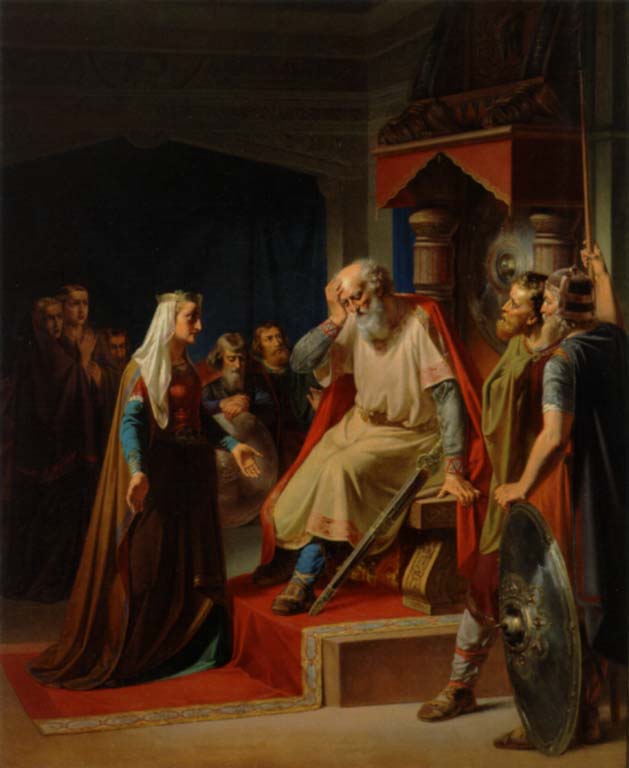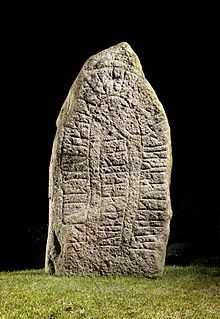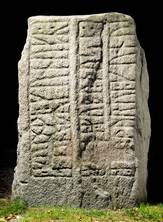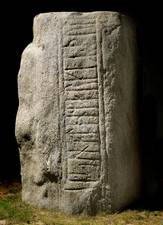Gorm was described as an "obdurant heathen" by the Christian
historian Adam Bede about 1023. [Jones 115]
Gorm is considered "old" due to the long length of his reign from
900 - 940.
The records for families of this age are based on the writing of
Snorri or Adam Bede which may be more mythical than
historical. Firm birth and death dates are unreliable.
A good translation and analysis has been done by the Foundation
for Medieval Genealogy. [
Foundation
for
Medieval Genealogy]
Gwyn Jones cites the removal of the Sweds by Gorm from the Jutland
colored the history recorded by Adam Bremen, the Christian
monk. The archbishop Unni was surprised by the change of the
future of Christianity in Jutland when he returned and found "not
a submissive king Gnupa(Swed) but an obdurate heather, King Gorm,
whose appearance on the scene, whatever Unni thought of it, must
be warmly welcomed by students today, for he can hardly be other
than Gorm, the old, husband of Thyri, the father of the renowned
Harald Båltonn, Bluetooth, and of Gunnhild Mother of Kings,
the wife and widow of Erick Bloodax of Norway." Adam and the
misconceptions of Saxo and Sven Aggeson, "thought of him old and
slothful" but he and his heirs were to rule the Viking world for
nearly a hundred years [Jones 113]
Wheaton writes,
"Gorm, the son of Harde-Knud I, surnamed the Old, from
the length of his reign, was enabled, by a similar concurrence
of circumstances, to subdue the petty kings of Jutland, and to
unite into one state the different countries which no constitute
the Danish monarchy, including the provinces of Scania and
Halland, since ceded to Sweden by the treaty of 1720. This
change was facilitated both in Norway and Denmark by the absence
of many of the petty kings, Jarls, and principal chieftains, in
distant sea-roving and other predatory expeditions. Gorm
had distinguished himself in his early youth for his wild,
adventurous spirit in common with the other Norman invaders of
France, was subsequently engaged in a sea-roving expedition
along the coasts of the Baltic, and penetrated with a band of
Vaeringjar and other adventurers to Smolensko and Kiow(Kiev), in
Russia. He had espoused the famous Thyra Dannebod,
daughter of Hararld, a Jarl of Jutland, who was converted to
Christianity in France, during the reign of Louis le Debonnaire,
and had caused his daughter to be baptized into the new religion
in her childhood. Her influence contributed to induce King
Gorm to tolerate the preaching of the Christian Missionaries in
his dominions, although he continued to revere the ancient
national deities who had been worshipped by his
ancestors." [Wheaton 266-267]

"Gorm the Old receives the news of the death of his son
Canute"
Danish: "Thyra Dannebod meddeler Kong Gorm den Gamle
underretning om hans søn Knuds død"
painting by August Carl Vilhelm Thomsen (1813-86)
courtesy of wikimedia. commons
General Notes from Wikitree.com: Gorm's wife was Tyra - of that
there is no doubt. But her parentage is even more mysterious that
Gorm's.
There seems to be more evidence to support the
tradition that Gorm's wife was English.
In the first place, Tyra was a Christian. It is far more
likely that a Christian princess would have come from England,
where the royal family were Christians, than from Jutland,
which was still thoroughly pagan despite the early missionary
efforts of Ansgar.
Whatever her ancestry, Gorm's Christian wife seems to have been
a kindly woman, and very popular with her subjects. But she was
unable to convert her husband to Christianity, and he remained a
staunch pagan until his dying day.
Thyra married Gorm "The Old" Haraldsson King Of DENMARK son of
Harald "Parcus" King Of Sjaelland DENMARK and Elfgifu Princess
Of WESSEX, about 897 in Denmark. Gorm was born about 880 in
Sjaelland Island, Denmark and died in 936 in Jellinge Vejle,
Denmark 2918,3201 about age 56. Other names for Gorm were Gorm
De Gamel, Gorm "The Old" Den GAMLE King Of Denmark, and Gorm
"The Old" HARALDSSON King Of Denmark.
Thyra next married Geva KNUDSSON, son of Hardecanute (Knud)
Sigurdsson King Of DENMARK and Elgiva, about 897 in Denmark.
Geva was born before 850 in Denmark and died in 936 in Jellinge,
Vejle, Denmark. Another name for Geva was Gorm Hardaknutsson.
King of Denmark, founder of the Jelling Dynasty. Made his mains
set at Jelling, home of the two biggest burial mounds in Denmark
and by two runic stones, one erected by Gorm and the other by
his son Harold the Bluetooth. The latter stone reads, "Harald,
the king, ordered this memorial made for his father Gorm and his
mother, Thyra, the Harald who won all of Denmark, and also
Norway, and (made) the Danes Christians." [An Outline History of
Denmark]
Gorm married Thyra, the daughter of one of the regional chiefs,
probably from southern Jutland. Claims that Thyra was a daughter
of King Harald Klak have been discounted due to the
impossibility of the ages of the persons involved.
"Danebod" was a name given Thyra for her initiative in
building fortifications around the boundaries of her
region. This may be a historical fabrication. Gorm
himself perhaps should be created with this according to Gwyn
Jones. He is said to have unified the several minor
principalities into a single domain as the King of Denmark in
930. He is listed as the person who identifies the
domain as Danmark. [Jones 114]
Apparently Gunhild Gormsdottir (c.901/10 - c. 980) who
married Eric Bloodaxe, was the mother of several kings of
Norway. She was, according to Jenny Jochens, known for her
"power and cruelty, admired for her beauty and generosity, and
feared for her magic, cunning, sexual insatiability, and her
goading" She spent much of her life in exile in Orkney,
Jorvik and Denmark. [wikipdia.com - Gunhild Gormsdøttir]
her offspring:
Gamle Eirikssen
Harald II
"Greycloak" - a king of western Norway after 961
Ragnfrød
Eirikssen
Ragnhild
Eriksdottir - a scheming woman, 1st m. Arnfinn Thorfinnsson, son
of Thrfinn Torf-Enarsson, Earl of Orkney
Erling
Eirikssen
Gudrød
Eiriksson
Sigurd Sleva
Røgnvald
Eriksson
Gunhild was often connected to sorcery and was apparently killed
on the orders of Haakon Sigurdsson, jarl of Hladir, in 971 by
drowning in a bog.
His son GORM, who had the surname of "The Englishman,"
because he was born in England, gained the sovereignty in the
island on his father's death; but his fortune, though it came
soon, did not last long. He left England for Denmark to put it
in order; but a long misfortune was the fruit of this short
absence. For the English, who thought that their whole chance of
freedom lay in his being away, planned an open revolt from the
Danes, and in hot haste took heart to rebel. But the greater the
hatred and contempt of England, the greater the loyal attachment
of Denmark to the king. Thus while he stretched out his two
hands to both provinces in his desire for sway, he gained one,
but lost the lordship of the other irretrievably; for he never
made any bold effort to regain it. So hard is it to keep a hold
on very large empires.
After this man his son HARALD came to be king of Denmark; he
is half-forgotten by posterity, and lacks all record for famous
deeds, because he rather preserved than extended the possessions
of the realm.
After this the throne was obtained by GORM, a man whose soul
was ever hostile to religion, and who tried to efface all regard
for Christ's worshippers, as though they were the most
abominable of men. All those who shared this rule of life he
harassed with divers kinds of injuries and incessantly pursued
with whatever slanders he could. Also, in order to restore the
old worship to the shrines, he razed to its lowest foundations,
as though it were some unholy abode of impiety, a temple which
religious men had founded in a stead in Sleswik; and those whom
he did not visit with tortures he punished by the demolition of
the holy chapel. Though this man was thought notable for his
stature, his mind did not answer to his body; for he kept
himself so well sated with power that he rejoiced more in saving
than increasing his dignity, and thought it better to guard his
own than to attack what belonged to others: caring more to look
to what he had than to swell his havings.
This man was counselled by the elders to celebrate the rites
of marriage, and he wooed Thyra, the daughter of Ethelred, the
king of the English, for his wife. She surpassed other women in
seriousness and shrewdness, and laid the condition on her suitor
that she would not marry him till she had received Denmark as a
dowry. This compact was made between them, and she was betrothed
to Gorm. But on the first night that she went up on to the
marriage-bed, she prayed her husband most earnestly that she
should be allowed to go for three days free from intercourse
with man. For she resolved to have no pleasure of love till she
had learned by some omen in a vision that her marriage would be
fruitful. Thus, under pretence of self-control, she deferred her
experience of marriage, and veiled under a show of modesty her
wish to learn about her issue. She put off lustful intercourse,
inquiring, under the feint of chastity, into the fortune she
would have in continuing her line. Some conjecture that she
refused the pleasures of the nuptial couch in order to win her
mate over to Christianity by her abstinence. But the youth,
though he was most ardently bent on her love, yet chose to
regard the continence of another more than his own desires, and
thought it nobler to control the impulses of the night than to
rebuff the prayers of his weeping mistress; for he thought that
her beseechings, really coming from calculation, had to do with
modesty. Thus it befell that he who should have done a husband's
part made himself the guardian of her chastity so that the
reproach of an infamous mind should not be his at the very
beginning of his marriage; as though he had yielded more to the
might of passion than to his own self-respect. Moreover that he
might not seem to forestall by his lustful embraces the love
which the maiden would not grant, he not only forbore to let
their sides that were next one another touch, but even severed
them by his drawn sword, and turned the bed into a divided
shelter for his bride and himself. But he soon tasted in the
joyous form of a dream the pleasure which he postponed from free
loving kindness. For, when his spirit was steeped in slumber, he
thought that two birds glided down from the privy parts of his
wife, one larger than the other; that they poised their bodies
aloft and soared swiftly to heaven, and, when a little time had
elapsed, came back and sat on either of his hands. A second, and
again a third time, when they had been refreshed by a short
rest, they ventured forth to the air with outspread wings. At
last the lesser of them came back without his fellow, and with
wings smeared with blood. He was amazed with this imagination,
and, being in a deep sleep, uttered a cry to betoken his
astonishment, filling the whole house with an uproarious shout.
When his servants questioned him, he related his vision; and
Thyra, thinking that she would be blest with offspring, forbore
her purpose to put off her marriage, eagerly relaxing the
chastity for which she had so hotly prayed. Exchanging celibacy
for love, she granted her husband full joy of herself, requiting
his virtuous self-restraint with the fulness of permitted
intercourse, and telling him that she would not have married him
at all, had she not inferred from these images in the dream
which he had related, the certainty of her being fruitful.
By a device as cunning as it was strange, Thyra's pretended
modesty passed into an acknowledgment of her future offspring.
Nor did fate disappoint her hopes. Soon she was the fortunate
mother of Kanute and Harald. When these princes had attained
man's estate, they put forth a fleet and quelled the reckless
insolence of the Sclavs. Neither did they leave England free
from an attack of the same kind. Ethelred was delighted with
their spirit, and rejoiced at the violence his nephews offered
him; accepting an abominable wrong as though it were the richest
of benefits. For he saw far more merit in their bravery than in
piety. Thus he thought it nobler to be attacked by foes than
courted by cowards, and felt that he saw in their valiant
promise a sample of their future manhood.
For he could not doubt that they would some day attack foreign
realms, since they so boldly claimed those of their mother. He
so much preferred their wrongdoing to their service, that he
passed over his daughter, and bequeathed England in his will to
these two, not scrupling to set the name of grandfather before
that of father. Nor was he unwise; for he knew that it beseemed
men to enjoy the sovereignty rather than women, and considered
that he ought to separate the lot of his unwarlike daughter from
that of her valiant sons. Hence Thyra saw her sons inheriting
the goods of her father, not grudging to be disinherited
herself. For she thought that the preference above herself was
honourable to her, rather than insulting.
Kanute and Harald enriched themselves with great gains from
sea-roving, and most confidently aspired to lay hands on
Ireland. Dublin, which was considered the capital of the
country, was beseiged. Its king went into a wood adjoining the
city with a few very skilled archers, and with treacherous art
surrounded Kanute (who was present with a great throng of
soldiers witnessing the show of the games by night), and aimed a
deadly arrow at him from afar. It struck the body of the king in
front, and pierced him with a mortal wound. But Kanute feared
that the enemy would greet his peril with an outburst of
delight. He therefore wished his disaster to be kept dark; and
summoning voice with his last breath, he ordered the games to be
gone through without disturbance. By this device he made the
Danes masters of Ireland ere he made his own death known to the
Irish.
Who would not bewail the end of such a man, whose self-mastery
served to give the victory to his soldiers, by reason of the
wisdom that outlasted his life? For the safety of the Danes was
most seriously endangered, and was nearly involved in the most
deadly peril; yet because they obeyed the dying orders of their
general they presently triumphed over those they feared.
Germ had now reached the extremity of his days, having been
blind for many years, and had prolonged his old age to the
utmost bounds of the human lot, being more anxious for the life
and prosperity of his sons than for the few days he had to
breathe. But so great was his love for his elder son that he
swore that he would slay with his own hand whosoever first
brought him news of his death. As it chanced, Thyra heard sure
tidings that this son had perished. But when no man durst openly
hint this to Germ, she fell back on her cunning to defend her,
and revealed by her deeds the mischance which she durst not
speak plainly out. For she took the royal robes off her husband
and dressed him in filthy garments, bringing him other signs of
grief also, to explain the cause of her mourning; for the
ancients were wont to use such things in the performance of
obsequies, bearing witness by their garb to the bitterness of
their sorrow. Then said Germ: "Dost thou declare to me the death
of Kanute?" (2) And Thyra said: "That is proclaimed by thy
presage, not by mine." By this answer she made out her lord a
dead man and herself a widow, and had to lament her husband as
soon as her son. Thus, while she announced the fate of her son
to her husband, she united them in death, and followed the
obsequies of both with equal mourning; shedding the tears of a
wife upon the one and of a mother upon the other; though at that
moment she ought to have been cheered with comfort rather than
crushed with disasters.[Saxo chap.1X]
After 985 - Toke (also known as Valtolke), son of Gorm, said to
the be Earl or Jarl of Vendsyssel, dies along with his son Asjorn
Tokesen in the Battle of Fyrisvellier, Sweden. Aars stone
was installed in Aars near the church. Apparently recent
excavations have proved that this area has been inhabited for at
least 4000 years. [wikipedia.org]






